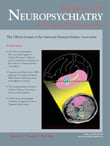Othello Syndrome Secondary to Right Orbitofrontal Lobe Excision
Case Report
The patient, a 61-year-old right handed woman with no psychiatric history, presented 1-year history of increasingly jealous behavior. She had no evidence of premorbid jealousy or paranoid personality traits. Her husband had been a trading company employee, and frequently made business trips. In 1985, she suffered from tuberculum sellae meningioma. The right orbitofrontal cortex was removed in the process of extirpating the meningioma through intrahemisphere approach. Following the operation, she became irritable and pathologically persistent. She persisted in saying that her son should marry in haste, which ultimated in his running away from home. In 2001, she started to accuse her husband of infidelity. She insisted that he was having an affair with a 70-year-old woman who was a member of their ground golf circle. Also, she believed that they held a wedding ceremony and had more than 10,000 children. At this point, she had a medical examination. She was normotensive and blood chemistry and hematology were normal. The Hasegawa Dementia Rating Scale–Revised score was 30/30. An MRI scan revealed a deficit of the right orbitofrontal cortex.
In 2001, her accusations became more severe and her husband consulted our clinic. Mental state examination revealed that she tended to confabulate and was easily distracted. Her speech was grammatically correct. In addition to delusional jealousy, she experienced auditory hallucinations that told her her husband was unfaithful. She believed that her husband’s mistress would frequently visit their house and steal things. She pinched a piece of paper in the door to see if someone came into her home when she went out. Her Mini-Mental State examination (MMSE) score was 29/30. She could remember five items and her autobiographical memory was intact. Her family history for mental illness was negative.
Her husband reported that she bought unnecessary articles and sometimes coerced him to shoplift. Her son complained that she repeatedly called him and tried to persuade him to marry. In addition, she sometimes made sexual jokes to him and complained about her sexless life. Because she refused medicine, we offered a supportive psychotherapy to her husband to relieve his burden. As he became adept at dealing with her accusations, the frequency and severity of her accusations gradually decreased.
Comment
The present patient was unique in having localized cerebral pathology. In previous reports of organic Othello syndrome, lesion areas were rather broad. 2 – 4 This case suggests that the Othello syndrome may be caused solely by right orbitofrontal lesions. In men, it is suggested that sexual dysfunction plays an important role in the development of this syndrome. Although our patient did not have sexual dysfunction, hypersexuality might cause an excessive sex drive. In addition to hypersexuality, she revealed frontal lobe syndrome, including antisocial behavior and distractibility. Dysfunction of the frontal system might preclude her from correcting her misbelief in the face of contradictory evidence, which was suggested in other content-specific delusions. 5 Finally, the additional role of psychological stress, such as solitude, which is common in middle-aged woman, should also be underlined.
1. Enoch MD, Trethowan WH, Barker JC: Uncommon psychiatric syndromes. Chicago, Year Book Medical, 1979, pp 36–49Google Scholar
2. Richardson ED, Malloy PF, Grace J: Othello syndrome secondary to right cerebrobascular infarction. J Geriatr Psychiatry Neurol 1991; 4:160–165Google Scholar
3. Silva A, Leong GB: A case of organic Othello syndrome. J Clin Psychiatry 1993; 43:277Google Scholar
4. Soyka M: Delusional jealousy and localized cerebral pathology. J Neuropsychiatry Clin Neurosci 1998; 10:472Google Scholar
5. Malloy PF, Richardson ED: The frontal lobes and content-specific delusions. J Neuropsychiatry Clin Neurosci 1994; 6:455–466Google Scholar



